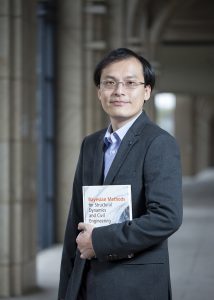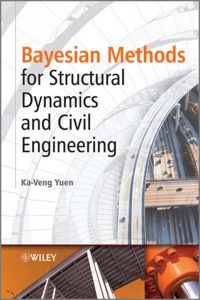It was once said that the mark of a true writer is the patience to sit at his writing desk in oblivion for ten years in order to produce one masterpiece. This is also a fitting description of Prof Yuen Ka Veng, who, despite not being a writer, embodies the same kind of perseverance in his research. An earthquake engineering expert and a recipient of a second prize of the Natural Science category in the 2020 Macao Science and Technology Award, Prof Yuen stumbled upon his lifelong passion, Bayesian inference, 23 years ago. He often tells young scholars: ‘In order to succeed, you must focus on what you are good at and never give up.’
The Debut of a Young Scientist on the World Stage
Prof Yuen is currently the dean of the Graduate School at the University of Macau (UM), as well as a Distinguished Professor in the Faculty of Science and Technology (FST) and State Key Laboratory of Internet of Things for Smart City. His academic achievements are impressive: he graduated from the Department of Civil Engineering of Taiwan University in 1997, obtained his master’s and doctoral degrees in civil engineering from the Hong Kong University of Science and Technology and the California Institute of Technology (Caltech) in 1999 and 2002, respectively. He served as an assistant professor in the Department of Civil and Environmental Engineering at UM and was promoted to associate professor four years later. In 2010, he became the first UM scholar to be promoted to full professor before the age of 35. In 2018, he became the first scholar at UM to be promoted to Distinguished Professor before age 43. Later, he served as the department head of the Department of Civil and Environmental Engineering, associate dean and interim dean of the FST, and registrar of UM.
Prof Yuen’s specialties include Bayesian inference, uncertainty quantification, system identification, structural health monitoring, reliability analysis, and analysis of dynamical systems. In 2004, he published a journal paper co-authored with his then-supervisor Prof James Beck at Caltech and this paper received great attention. Being the first in the field of structural dynamics to tackle the problem of model class selection, this paper was ranked among the ten most cited, out of more than 3,000 papers, published in the Journal of Engineering Mechanics of the American Society of Civil Engineers in last few decades. Last year, a team of scholars at Stanford University selected the top 1.5 per cent of scientists from 7 million scientists around the world by using a standard that integrates six citation indicators, and published the results in PLOS Biology in October 2019. Out of the 100,000 scientists in the list, 1,646 are Chinese and 125 are in the area of civil engineering. Prof Yuen was the only civil engineering scientist from Macao to make the list. This year, Prof Yuen was invited to serve as an editorial board member of the internationally renowned journal Computer-Aided Civil and Infrastructure Engineering, which has the highest impact factor among all civil engineering journals. Only five scholars from Asia are in this board, showing international recognition of his academic achievements.
Award-winning Project: 18 Years in the Making
Recently, Prof Yuen received a second prize in the Natural Science category of the Macao Science and Technology Award, for his project titled ‘Bayesian Methods for Structural Dynamics: from Offline to Real-Time’. His success was no fluke. The award-winning project is the result of 18 years of hard work. Over the past 18 years, he started from scratch at UM, advancing steadily from offline to real-time, linear to non-linear, stationary data to non-stationary data, parametric identification to model class selection and then system identification using self-calibratable model classes, with impressive results achieved at each stage. His grit and perseverance set a shining example for the younger generation. When he was asked how he felt about receiving the award, Prof Yuen said: ‘I am very grateful to the Macao SAR government and the Macao Science and Technology Development Fund for their support to the researchers. This recognition is a tremendous source of encouragement.’
Scientific fruits are the result of years upon years of deep thinking, meticulous research, and repeated falsification and verification. According to Prof Yuen, two decades ago, Bayesian methods were limited to solving simple, purely academic problems, such as known input of the system. He began to develop new Bayesian methods that could fit real-world engineering conditions. Many of his methods developed over the years are still widely used today, not only in structural engineering, but also in many other fields, such as air pollution modelling, soil mechanics, rock mechanics, computational physics, neuroscience, smart transport, and communication engineering.
Scientific Research Requires Tolerance for Loneliness
Looking back, Prof Yuen feels very fortunate that he started conducting research in the field of structural health monitoring relatively early. He says: ‘Research in this field emerged in the 1980s, but it wasn’t until around the late 1990s and the early 2000s that a handful of researchers began to apply Bayesian methods in their research. I am most grateful for the help of my former supervisor, Professor James Beck, whose guided me to crack one problem after another in the field of Bayesian system research.’
When asked how one can continuously improve in scientific research, he says: ‘You must focus on what you are good at, and then persevere in doing it day after day. Doing research requires focus; it also requires tolerance for loneliness. Choose a direction and keep digging. Don’t be a jack-of-all-trades but master of none. That will not solve any meaningful problems.’
Giving Back to Society through Research
In 2008, long before UM relocated to the current campus, Prof Yuen and his students spent five years on all-weather monitoring of the condition of the East Asia Hall on the old campus, studying the long-term structural effects of temperature, humidity, and other environmental factors. His team even observed the extreme behaviour of the building under severe storm conditions. Since then, his research methods have been used in structural health monitoring of many buildings in different cities, including the Guangzhou TV Tower and the Sutong Yangtze River Bridge in mainland China, as well as the Ting Kau Bridge and the International Finance Centre in Hong Kong. He explains: ‘The advantage of using the Bayesian method to monitor the structural health of a building is that it can quantify uncertainty. The real-time identification method can determine the health of a building in tens of seconds, which allows us to quickly “take the pulse” of a building.’
Prof Yuen says the establishment of the State Key Laboratory of Internet of Things for Smart City at UM has given him more opportunities to serve society through research. As a researcher, Prof Yuen is committed to continuously advancing Bayesian research; as a dedicated educator, he hopes to pass his knowledge on to his students and train more scholars in the field of civil engineering. He is now preparing two books with other collaborators, hoping to promote the use of Bayesian methods in more fields. ‘We hope to give back to society through research,’ he says.
Source: My UM E-Version
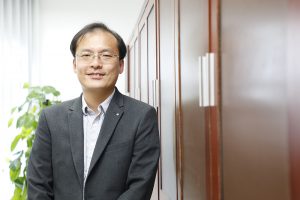
Prof Yuen believes that scientific research requires single-minded focus
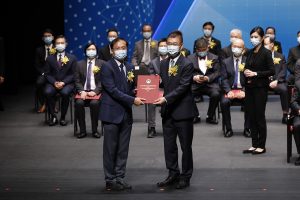
Prof Yuen Ka Veng, recipient of a second prize of the 2020 Macao Science and Technology Award in the Natural Science category
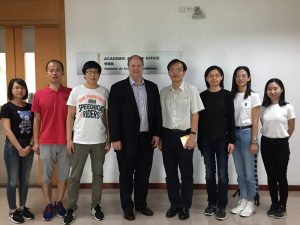
Prof Yuen and his students with Prof Erik Johnson, associate dean of the University of South California’s School of Engineering, during Johnson’s visit to UM
